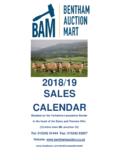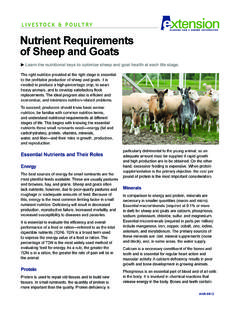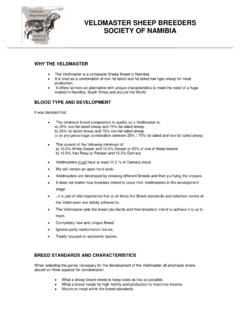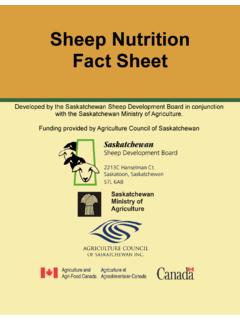Transcription of Red Clover in Sheep Pasture?
1 Red Clover in Sheep Pasture? Photos by Author Ulf KintzelWith reliable frequency I will see at least once a year an article in a leading Sheep publication warning us of the danger that red Clover poses when grazed before, during, and shortly after Sheep breeding season. Red Clover is said to cause infertility in breeding ewes due to an estrogen-like substance called phyto-estrogen that can be found in the plant. The same has been said about white Clover and other legumes, but mostly about red Clover . The infertility can be temporary and affects the Sheep for as long as they are being grazed on red Clover , but also can be permanent if red Clover is grazed over an exceedingly long period of time.
2 Such advice should have every Sheep farmer avoid having red Clover or any Clover in the pasture, but are these stark warnings indeed warranted?After all, we know several good things about red Clover . First and foremost, red Clover is both high in protein and energy and is also high in digestible nutrients. Furthermore, red Clover , just like other legumes, forms a symbiosis with the soil bacterium rhizobium, which is able to fixate air nitrogen. This nitrogen feeds the plants and reduces the need for commercial fertilizer. In addition, seed cost for red Clover is low and it is also easily established. If there ever was a plant designed for frost seeding, it would have to be red Clover .
3 Four to five pounds of seed per acre will give you a good stand of red Clover the same year as seeded. High yield and relative drought resistance are two more positive traits of this legume. On top of all this, Sheep love eating red Clover and fatten easily on should you have red Clover in your Sheep pasture? The short answer is yes. Here is the long answer: Articles In this mixture of red Clover , orchards grass, and birdsfoot trefoil, the red Clover is being eaten first.[ 12 ] Farming Magazine Farming Magazine [ 13 ]addressing the infertility almost never cite the source for the claim. However, among those authors that have cited a study, they most often cited a study conducted in Australia in 1946 by Bennett et al.
4 This trial was the first to identify Clover disease, but was conducted with grazing ewes on subterranean took the time and did my own research, hoping to find field studies about red Clover . I happen to be a firm believer in science, but only in the case of field studies relevant to real life and not paid for by people who want a certain outcome. The most prominent study on red Clover I found was a field trial in Australia by Barrett et al in1965. Concerning field trials in the , I could only find one study Fox et al 1959 that confirmed the effects of red Clover on Sheep fertility. On the other hand, I distinctly remember a study conducted in East Germany where I come from that found no significant impact of red Clover on Sheep fertility.
5 However, I am unable to cite the be clear, I don t dismiss the science that says there are estrogen-like substances in red Clover that may cause infertility in Sheep . I am unclear about the relevance, however. Firstly, do studies in Australia in the southern hemisphere matter to us the same way? Secondly, does one study conducted in the 53 years ago allow for such widespread advice against the use of red Clover ? Furthermore, it is clear that there are factors that influence the level of these estrogen-like substances in red Clover , the level is lower when the plant is blooming, compared to the level before blooming. No conclusive studies have been conducted to examine different levels at different stages, in different varieties, and the likes.
6 And then there is contrary anecdotal evidence of Sheep farmers who graze red Clover before, during, and after breeding and notice no negative impact on fertility. This includes me. I am in my 28th year of raising Sheep on different continents and different states. At all times I grazed red Clover , either in pure stands or in mixes with grass. My current lambing percentage of adult ewes exceeds 180 percent. I have a conception rate of about 99 percent and above. That means among my current 250 breeding ewes, each year I have a Sheep or two that does not get pregnant. Is it the red Clover ?
7 I don t know; we just eat those and don t give it a second thought. We have a need for summer sausage, salami, and hot dogs too. In my view, such low infertility is not worth examining. Of course, one could argue that my lambing percentage would be higher if I were not to graze red Clover . However, I would find that argument too summary, we know how nutritious and highly digestible red Clover is. We know it fattens Sheep easily. We know it is well liked and readily eaten. We know it can fixate air nitrogen and thus reduce the need for fertilizer. We know it is drought resistant. We know it can be easily established, can be frost-seeded, and its seed cost is fairly low.
8 We also know it yields a lot of dry matter. We know all that for sure. What we don t know for sure is if its estrogen-like substances can cause infertility in Sheep on a scale that warrants warning against it time and again despite its manyfold advantages. Few too few I would argue field studies have been conducted to conclusively prove that red Clover causes infertility on such a scale that it outweighs its benefits. So should you incorporate red Clover into your Sheep pasture or should you spend time and money to crowd out your clovers because it may or may not cause infertility in Sheep ? You decide. I surely will keep grazing my clovers, including the red. Too great are its benefits to do without it.
9 I think of it every day while I am writing this and while we are in the midst of a drought. The one plant that keeps growing is the red Kintzel is a native of Germany and lives in the US since 1995. In 2006 he moved from New Jersey to Rushville in the Finger Lakes area in upstate New York. Ulf owns and operates White Clover Sheep Farm. He breeds and raises grass-fed White Dorper Sheep without any grain feeding. His website address is He can be reached by e-mail at or by phone at 585-554-3313. At the onset of a drought: look what keeps growing anyway.







